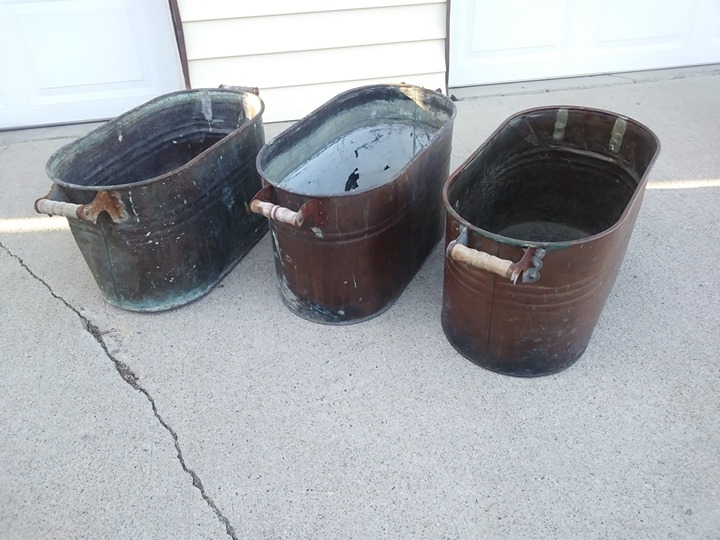You are using an out of date browser. It may not display this or other websites correctly.
You should upgrade or use an alternative browser.
You should upgrade or use an alternative browser.
Old copper wash tubs boiler for brewing kettle?
- Thread starter Dsh1109
- Start date

Help Support Homebrew Talk - Beer, Wine, Mead, & Cider Brewing Discussion Forum:
This site may earn a commission from merchant affiliate
links, including eBay, Amazon, and others.
How big are the batches you intend to brew? Do you really need something this large?
The one of the left looks like it's leaking on the bottom rim.
Do you know what's been in them? They need a heck of a good solid cleaning.
The bottoms are probably kinda thin, which can become a wort scorching problem.
The one of the left looks like it's leaking on the bottom rim.
Do you know what's been in them? They need a heck of a good solid cleaning.
The bottoms are probably kinda thin, which can become a wort scorching problem.
I wouldn't boil in a copper vessel. Copper contributes to what are called Fenton Reactions, which create staling compounds in the wort and eventually the beer.
Thanks for the advice fellas. Apparently they were a hot commodity and sold within 3 hrs of being up. Reason I was looking for it is I’m running a tight budget and actually brewing witha borrowed turkey fryer from my church. I guess I’ll be sticking to it for another little while. If this thread should be closed feel free if a mod sees this.
Keep looking for the right deal. Were those on CraigsList?Thanks for the advice fellas. Apparently they were a hot commodity and sold within 3 hrs of being up. Reason I was looking for it is I’m running a tight budget and actually brewing witha borrowed turkey fryer from my church. I guess I’ll be sticking to it for another little while. If this thread should be closed feel free if a mod sees this.
Is 10 gallons your average batch size or do you want to go larger? 15 gallon kettles aren't crazy expensive anymore, especially used. You only need one, basically.
We'll keep the thread open, no need to close it. Who knows where it will lead?
Depending on where you live, this setup is a pretty decent deal.
I wouldn't boil in a copper vessel. Copper contributes to what are called Fenton Reactions, which create staling compounds in the wort and eventually the beer.
This ^^^^
Tight budget, I would find a cheap 15 gallon kettle and do single vessel BIAB. You could go even smaller, but I found myself buying multiple times. Would have been cheaper to just start at 15g.
doogie
Well-Known Member
I believe that most of those kettles were soldered with lead...so again NO
I've seen this, and I do believe it, but it leads to a question: All those pictures of commercial beautiful shiny copper kettles, especially in Germany, but also Anchor Steam and others. Do they line them with something to prevent the Fenton reactions? Or is it a volume thing? Or are they doing something else to prevent problems?I wouldn't boil in a copper vessel. Copper contributes to what are called Fenton Reactions, which create staling compounds in the wort and eventually the beer.
I've seen this, and I do believe it, but it leads to a question: All those pictures of commercial beautiful shiny copper kettles, especially in Germany, but also Anchor Steam and others. Do they line them with something to prevent the Fenton reactions? Or is it a volume thing? Or are they doing something else to prevent problems?
I don't know the answers to your questions.
Some of this effect depends on how quickly beer is consumed--sort of like the best way to enjoy an IPA is to enjoy it fresh, as the hop aroma/flavors will diminish with time.
What I called staling compounds are oxidizing compounds, and so I'd presume the same effect is there as if you oxygenated fermented beer. There's an anecdotal report of one guy who did an IPA using LODO techniques, kegged in two 5-gallon kegs. One he had months after brewing, and it was (he said) just as good as the first one, no degradation.
There are ways to mitigate the effects--using things like Brewtan-B, for instance. Maybe that's part of their processes, but that's just a supposition.
*****
As an aside, I've always thought Anchor Steam had something "off" about its flavor. I brew a California Common I think is much superior to AS. Might just be my palate, but now that I think about it, I wonder how much of what I perceive in AS is oxidation. I have a bottle of AS in my fridge; going to have to try that and see.
In some contexts, certain flavors--oxidation, perhaps--might be seen as emblematic of the style. Sort of like how fermenting warm works for Saisons because the yeast expresses flavors at that temp that would be inappropriate in another beer.
Similar threads
- Replies
- 2
- Views
- 508
- Replies
- 0
- Views
- 697
- Replies
- 4
- Views
- 698
- Replies
- 17
- Views
- 1K



